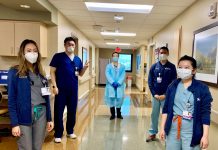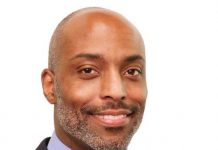By Roxanne Okeke
Nationwide, we are seeing a growing focus on a part of our community that has too often been ignored or abused in the past: a focus on members of the LGBTQIA (or LGBTQ+) community. This is a good thing as it is important that people who identify as LGBTQ+ are treated with respect and dignity.
In recent years, Nevada has made great gains in providing LGBTQ+ members important civil rights, such as the passing of SB-97 (a Nevada Senate bill which denies the use of gay and trans panic attacks by defendants as legal justification for the assault and murder of LGBTQ individuals). When he served as Assistant Assembly Majority Leader in Las Vegas, Nelson Araujo also proposed an amendment in Jan. 2017, one that would ensure same-gender marriage is protected should the 2015 U.S Supreme Court ruling be overturned in the future.
Great, but how have we trained our health care providers in treating LGBTQ+ individuals here in Nevada? Upon looking at the 2019-2023 curriculum for the UNLV School of Medicine, available online, I noticed that there is no course listed that specifically addresses treating transgender patients, though some may argue it is already included in the curriculum.
Implementing a required annual sensitivity course specifi c to treating transgender patients into the curriculum at the University of Nevada Las Vegas (UNLV) School of Medicine will produce better doctors, who are more aware of how to behave around transgender patients and treat them with respect.
In 2018, Harvard Medical School adopted a $1.5 million program that would seek to address implementing LGBTQIA issues into the medical school curriculum, in order to address the concerns that LGBTQIA individuals face when seeking routine medical care and information for transition procedures for transgender individuals. Why haven’t we seen the same from medical schools here within our state?
Just browsing through Twitter using the hashtag #TransHealthFail, a hashtag that was popularized in 2015 by the startup company MyTransHealth, reveals a lot of disturbing stories from transgender users. These user detail their negative experiences while receiving routine medical care or treatment. One Twitter user explained how discouraged they felt when one cis-doctor refused to conduct an STD test using their blood sample when the physician discovered that the patient was transgender.
Another Twitter user explained how, while in and out of consciousness post-surgery, they heard a nearby doctor joking around with two adjacent male paramedics about what kind of genitalia they had and what kind of “freaky sex” the paramedics wanted to have with this individual, if possible. These kinds of actions dehumanize transgender individuals and are unacceptable from medical professionals.
Too many other users report rampant instances of misgendering by physicians and other health professionals during visits because they don’t “look transgender,” suggestions to trans teens by health care professionals that being trans is just a passing “phase,” sexual misconduct, and the inappropriate insistence on seeing trans patients’ genitalia when the visit does not require it. How many times does this have to happen before we decide we need to restructure the way we train our doctors?
The Hippocratic oath of “Do No Harm” to a patient means we treat patients with respect and kindness and respect their autonomy, a medical tenet which states that physicians must respect the right for patients to make their own choices regarding their health care. This includes the right for a transgender patient to decide whether or not to undergo hormone replacement therapy (HRT) and transition procedures, both of which are often very expensive.
It is important that in reading this, you understand that I am a privileged individual: while I am a minority (a female Nigerian-American), I am a cis woman who cannot truly understand the struggles that transgender individuals have to face.
As an ally to the transgender community, I’m not the sole voice of this movement. I want to work as an ally to advocate for transgender individuals in any way I can while recognizing when to step back and just listen. Based on the evidence provided, I would implore the administration at the UNLV School of Medicine to include a specific sensitivity class on treating transgender patients.
Thank you.
Roxanne Okeke, known as Chinazor by her friends and family, is a Nigerian-American Legislative Intern with the Human Rights Campaign. Her pronouns are she/her/hers. As a proud 2017 UNLV graduate with a Bachelor’s degree in Biological Sciences, she is very much interested in many diff erent fi elds of study, including human biology, public health, mental health, and public policy. She aspires to one day become a physician who can heal and inspire others. If you’re interested in learning more about her, you can follow her on Twitter @Chirox21.
Editor’s note: This letter from Roxanne Okeke cited 14 links to online articles which she used in her research. Being a print publication, we are unable to include the links. You can obtain them by sending a Twitter message to Okeke.




























